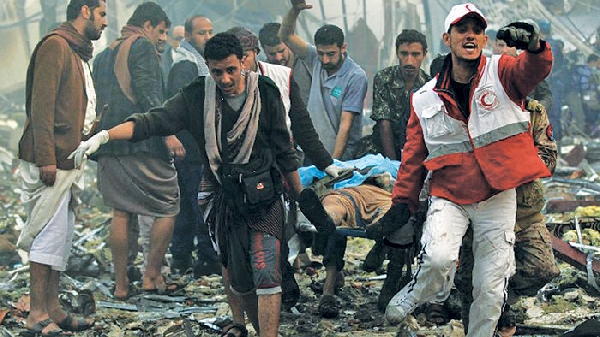
DEARBORN – Yemeni Americans are divided over the events unfolding in their homeland, but after a Saudi-led air strike claimed as many as 140 people at a funeral in Sanaa, they came together in condemning the attack.
Yemen is facing a humanitarian and political crisis because of the ongoing war that intensified after an Arab coalition, led by the Saudis, started bombing the country to quell the advances of Houthi militants allied with former president Ali Abdullah Saleh.
While the Western media portray the conflict as a proxy war between Saudi Arabia and Iran, which is said to be backing the Houthis, internal regional and political rivalries play a leading role in the unrest.
Divided, yet united
Ali Baleed Almuklani, a prominent leader in the Yemeni community who strongly opposes the Houthis and Saleh, did not hold back in denouncing the massacre.
Despite his political stance, he called for an investigation to bring the perpetrators of the tragedy to justice.
Almuklani called for Middle Eastern countries and Arab Americans alike to unite in fostering humanitarian efforts in Yemen, in place of foreign interventions that supply ammunition to militia groups that further divide the people.
He said a political solution must come from within the country – a reformed democratic government led by educated officials, chosen by Yemenis.
Almuklani urged local Yemenis not to bring clashes to their new American homes and to focus instead on youth education, ensuring college graduation and building bridges with other ethnic groups.
Basma Rashid, 24, fled her hometown, Ibb, about a four hour drive from Sanaa, for the United States a month ago.
Rashid said most people in her city want to expel Houthis, because they see the group’s governance as burdening and restricting. They hope to see a democracy prevail.
“The Houthis are arrogant,” she said. “They think they’re better than the rest, treat everyone else differently and don’t let their daughters marry outside the group.”
She also called the Houthis’ leader Abdul-Malik Badreddin al-Houthi a war criminal.
Rashid and her neighbors approve of Saudi air strikes on Houthi military bases, but criticized the country for being “sloppy” and bombing schools, hospitals and innocent civilians.
Acknowledging a political divide, Walid Fedama, a local Yemeni activist, said it is hard to believe any Yemenis do not stand against the, “bombing and killing of our people and our families.”
Although some would like to see an end to the Houthi rule, Fedama said for 18 months, Yemen has witnessed more than 180,000 air strikes and 400,000 rockets, missiles and bombs. Those attacks are not targeting military bases, but destroying schools, hospitals, roads, electricity and water supplies, he added.
Fedama said amid peace talks that began on April 18 in Kuwait, the Saudi-led coalition’s speaker announced that almost all Houthi military bases were destroyed.
“Why do they keep hitting bridges, schools and people at a funeral?” he asked.
As many Yemenis call for a people-based government, Fedama defended the Houthi control in Sanaa.
With the Houthis, at least the Yemeni people know what they are getting, he said.
Abdul-Malik Badreddin al-Houthi was born and raised in Yemen, is one of the prominent Zaidi scholars and his brothers were parliament members, Fedama said.
He added that instead of Saudi-backed forces, he would rather the country under the authority of Yemenis.
“I am a Yemeni and a Houthi is a Yemeni,” he said. “I am with the Houthi and any Yemeni that defends my country no matter what.”
Abdul Salah, a truck driver from Atlanta, said he is sick of hearing about peace negations when his country is continuously devastated by war.
The angry and riled up man said it is not that Yemenis back the Houthis, but that they are the only faction fighting against the Saudi bombing campaign.
“Saudi Arabia and the coalition are bombing Yemen, indiscriminately,” he said.
Abdul Salah echoed Almuklani’s assessment for solution in Yemen — an end to foreign intervention, allowing an internal resolution.
“People are just people; we’re not politicians,” he said. “I do not care who takes over. I just wanna see peace in my country.”
Diplomatic solution
Almost a year ago, Rep. Debbie Dingell (D-Dearborn), whose district includes a large Yemeni community, gave a passionate speech on the House floor urging President Obama to work with America’s allies to limit civilian casualties and seek a diplomatic solution in Yemen.
On the anniversary of that speech, the congresswoman reaffirmed her position. She told The AANews in a statement that the loss of life on all sides of the conflict is tragic.
“The human cost of this war is growing greater by the day and our first priority must be helping those in need and those who are trapped in the country with little access to medication, hospitals or even clean drinking water,” she said.
After the massacre in Sanaa, missiles were fired from Houthi-controlled territory towards U.S. warships, including U.S.S. Mason, in the Red Sea off Yemen’s coast. The attack missed the U.S. Navy ships. The military responded by bombing Houthi radar positions on Thursday, stressing that the strikes were limited.
This was the first direct U.S. attack on Houthi positions since the start of the war, although the United States has provided logistic support to the Saudi-led coalition.
Dingell called the attack on the Navy ships unacceptable.
“The United States reserves the right to defend and respond to all threats against our military personnel,” she said. “Further military escalation in Yemen, however, is not the answer. We need to focus on a diplomatic solution that will end hostilities in Yemen, promote peace and protect innocent lives.”






Leave a Reply